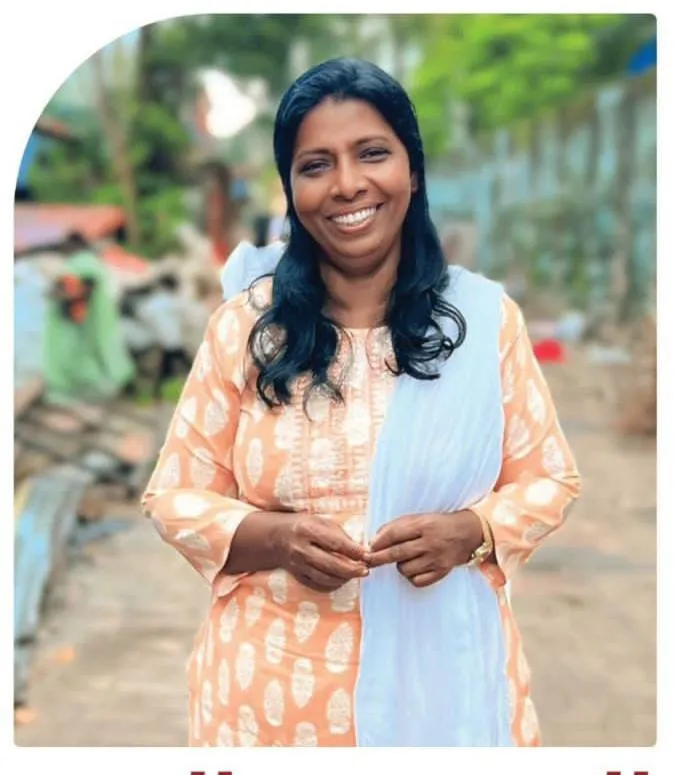Meet Dhanuja Kumari, a sanitation worker from Kerala whose book is part of university syllabus
Chenkalchoolayile Ente Jeevitham, a book written by S Dhanuja Kumari, a school dropout sanitation worker from a slum settlement in Thiruvananthapuram, is part of the curriculum at Calicut and Kannur Universities. She speaks to HerStory about her life and struggles.
On Independence Day this year, S Dhanuja Kumari was invited by the Governor of Kerala, Arif Mohammed Khan, to his residence.

Dhanuja Kumari
An invitation to the Raj Bhavan, a building Dhanuja passed by every day on her way to work, was no ordinary occurrence.
A sanitation worker (garbage collector) with the Haritha Karma Sena (a government waste management initiative), her book Chenkalchoolayile Ente Jeevitham (My Life at Chenkal Choola) was recently made part of the MA syllabus of Calicut University and the BA curriculum at Kannur University.
But Dhanuja was unaware of this until six months ago when some people told her about it. Neither the universities nor her publishers had informed her about it.
A chance meeting with Malayalam writer KR Indugopan at this residence while collecting garbage and a video on social media brought her into the limelight and made her story “viral”.
Speaking to HerStory, Dhanuja is both excited and elated. “It was an honour to meet the governor of Kerala. He welcomed me by calling me a ‘powerful lady’.”
Born and raised in Chenkal Choola, a slum settlement in Thiruvananthapuram (which has since been renamed Rajaji Nagar), Dhanuja is a ninth-standard school dropout.
She admits she has no connection to words or literature and her book is a result of an outpouring of different emotions.
While studying at the CSI residential school in Kollam, Kerala, from Class IV to VI, she was encouraged by the nuns to jot down all the “good” and “bad” things that had happened during the day.
“I started writing what I felt and continued writing even after I returned to Chenkalchoola and changed schools. I would write about my difficulties, sorrows, and stray moments of happiness. I would write about what I wore, what I ate, and where I went. I would write about the time I eloped with my now husband at the age of 15. I just kept on writing,” Dhanuja says.
She never kept those pieces of scrap she wrote on–on the back of books, on newspapers, or any piece of paper she laid her hands on.
“I threw away everything I wrote or burned them because I didn’t know I had to keep them or that I would write a book someday,” she reminisces.
Life in Chenkal Choola was one of infinite hardships. Discrimination based on caste, colour, and religion was rampant. Dhanuja would often speak, rage and angst often taking over when people would visit the slums for research or projects and there was no visible difference after they left.
Translating anger into words

Dhanuja with Kerala Governor Arif Mohammed Khan
During a writers’ meet organised at Chenkal Choola, Dhanuja met Malayalam writer PP Sathyan who urged her to translate her anger into words, something she was already good at.
“He told me to write a book about my experiences in Chenkal Choola and when people read about the colony, it will lead to a social discussion and there will be change,” she says. She took the help of Vichila, an editor, to shape her informal jottings into a book.
But Dhanuja made it clear that the book should reflect her voice--the language of someone who had only studied to the ninth standard. Chenkalchoolaliye Ente Jeevitham was published by Chintha Books in 2014.
“Our subjects of discrimination are now being studied in universities,” she says, adding that it is of some consolation.
There have been no job offers after her achievement made the news. She continues to pick up garbage from houses as part of the Haritha Karma Sena. She had applied to full-time jobs in the past but did not get any.
“I am working on another book on my experiences and publishers have come forward with offers to publish it. I am happy with the honour, respect, and recognition I have been receiving in the past few weeks. I couldn’t have asked for more,” she says.
Edited by Megha Reddy







